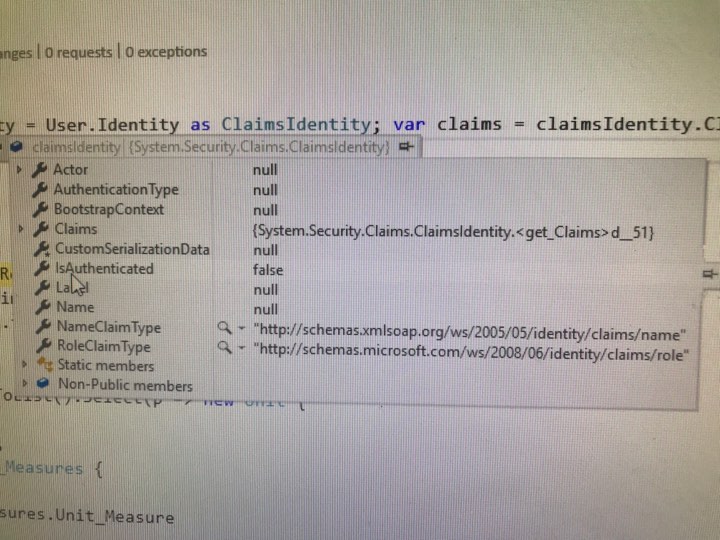 i am using asp.net Authorization to log in with Angular js for client side ,i need to get Current user logged in
i am using asp.net Authorization to log in with Angular js for client side ,i need to get Current user logged in
i need to get current User to save any operation in my logger Table, and httpcontext.session.current is null , is there is another way to save logged in user in session or some thing else to get it anytime
public class ApplicationOAuthProvider : OAuthAuthorizationServerProvider
{
private readonly string _publicClientId;
static ERPV02_03Entities db;
public ApplicationOAuthProvider(string publicClientId)
{
if (publicClientId == null)
{
throw new ArgumentNullException("publicClientId");
}
db = SingleTonConText.Instance;
_publicClientId = publicClientId;
}
public override async Task GrantResourceOwnerCredentials(OAuthGrantResourceOwnerCredentialsContext context)
{
var userManager = context.OwinContext.GetUserManager<ApplicationUserManager>();
ApplicationUser user = await userManager.FindAsync(context.UserName, context.Password);
if (user == null)
{
context.SetError("invalid_grant", "The user name or password is incorrect.");
return;
}
ClaimsIdentity oAuthIdentity = await user.GenerateUserIdentityAsync(userManager,
OAuthDefaults.AuthenticationType);
ClaimsIdentity cookiesIdentity = await user.GenerateUserIdentityAsync(userManager,
CookieAuthenticationDefaults.AuthenticationType);
AuthenticationProperties properties = CreateProperties(user.UserName);
AuthenticationTicket ticket = new AuthenticationTicket(oAuthIdentity, properties);
context.Validated(ticket);
context.Request.Context.Authentication.SignIn(cookiesIdentity);
}
public override Task TokenEndpoint(OAuthTokenEndpointContext context)
{
foreach (KeyValuePair<string, string> property in context.Properties.Dictionary)
{
context.AdditionalResponseParameters.Add(property.Key, property.Value);
}
var data= Task.FromResult<object>(null);
return data;
}
public override Task ValidateClientAuthentication(OAuthValidateClientAuthenticationContext context)
{
// Resourcee owner password credentials does not provide a client ID.
if (context.ClientId == null)
{
context.Validated();
}
return Task.FromResult<object>(null);
}
public override Task ValidateClientRedirectUri(OAuthValidateClientRedirectUriContext context)
{
if (context.ClientId == _publicClientId)
{
Uri expectedRootUri = new Uri(context.Request.Uri, "/");
if (expectedRootUri.AbsoluteUri == context.RedirectUri)
{
context.Validated();
}
}
return Task.FromResult<object>(null);
}
private static View_Emps GetUserInfo(string username)
{
var user = new View_Emps();
try
{
user = db.View_Emps.FirstOrDefault(p =>
p.Emp_UserName == username);
HttpContext.Current.Session.Add("user", user);
}
catch (Exception e)
{
throw e;
}
return user;
}
public static AuthenticationProperties CreateProperties(string userName)
{
var user = GetUserInfo(userName);
JavaScriptSerializer js = new JavaScriptSerializer();
var res = js.Serialize(user);
IDictionary<string, string> data = new Dictionary<string, string>
{
{ "User", res }
};
return new AuthenticationProperties(data);}}
public void SaveLog( T Obj, string Operation)
{
string hostName = Dns.GetHostName(); // Retrive the Name of HOST IpAddress
string myIP = Dns.GetHostEntry(hostName).AddressList[0].ToString();
var user = HttpContext.Current.Session["user"] as View_Emps;
MyLogger.Data = new JavaScriptSerializer().Serialize(Obj);
MyLogger.OperationType = Operation;
MyLogger.TableName = typeof(T).Name;
MyLogger.DateTime = DateTime.Now;
MyLogger.User_ID = user.Emp_ID;
MyLogger.IP_Address = myIP;
db.Loggers.Add(MyLogger);
Commit();
}

